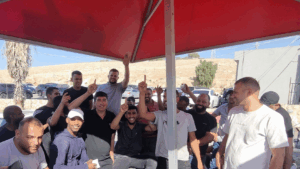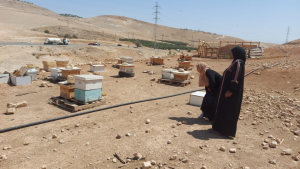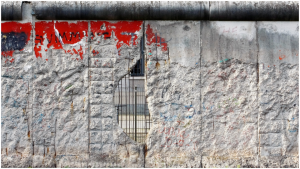By Omer Sharvit “Zman Israel” (Times of Israel) Aug. 31, 2025
Translation by MAAN
Initially shocked and outraged by the Hamas attack on October 7, Suleiman called out for the return of hostages. He expressed longstanding abhorrence of those responsible. As a result of the horrific events, he feared working with Israelis. Due to the delicate situation management sent him and other Palestinians home until tensions eased. Four months later, they returned to serve the influx of Israeli evacuees residing temporarily at the Dead Sea hotels.
He Returned to work at Leonardo Club, after previously working for more the 4 years at Leonardo Plaza (both belong to Fattal Group). Suleiman held a work permit which allows him accommodation at the hotel, returning home periodically. However, by July, 2025 he was summoned for a hearing and dismissed by month’s end, terminating nearly six years with the hotel chain.
“I am desperate to go back,” he said. “Upon parting, my direct manager was sad. Now, we [the Palestinian workers] are home, but we’re not guilty. They’re bringing in workers from Sri Lanka but we know things aren’t smooth. Some of us have been called back because the replacement workers from Sri Lanka didn’t work out.”
Alongside Suleiman, around 20 workers were dismissed, with the entire Dead Sea Palestinian Fattal staff of 200 poised for dismissal. Four employees were reinstated reportedly to manage holiday pressures, with their future post-September still uncertain.
Suleiman received an offer to pay 2,500 shekels to a broker for a new work permit but refused to submit to these corrupt practices. His last paycheck amounted to 11,000 shekels for approximately 90 regular hours, excluding weekends. He received only partial compensation for his tenure and seeks to fully realize his rights.
Upon receiving the news of workers that were given hearing summonses, MAAN approached Fattal Hotels on behalf of the workers. MAAN mentioned that the workers who were to be dismissed had no performance allegations, and thus the dismissals took place strictly due to policy changes regarding Palestinian employment in hotels, especially at the Dead Sea. MAAN highlighted that it checked the issue with the Civil Administration and found out that there were no new directives to dismiss workers in the Dead Sea area. MAAN questioned why these moves occurred before permit cancellations were finalized, and urged Fattal to wait and avoid economic devastation for the employees and their families.
Fattal responded that they are following government directives concerning Palestinians, whose entry permits are being revoked in favor of foreign workers. The Ministry informed the hotels: “With the foreign workers’ entry, Palestinian entry permits will be canceled, and employers must terminate their employment.”
The permits for foreign workers are phased in two stages, meant to replace the Palestinian worker quota. Fattal clarified that therefore its action in this regard were not arbitrary but in compliance with the Government directives.
Sri Lankan Workers Replacing Palestinians
Hotels received instructions from the Tourism Ministry, led by Haim Katz of Likud, to lay off dedicated, Hebrew-speaking workers familiar with the local culture, replacing them with laborers from the Indian Ocean Island. There are bilateral agreements with some countries supplying these workers, yet private recruitment continues, bringing indebted workers to Israel.
The displaced hotel staff join 104,000 Palestinians who lost work permits at the war’s onset. The few that were spared unemployment and poverty were few thousand workers, classified as essential. Despite Defense Ministry calls to gradually reinstate the workers, the government refuses, escalating economic crises within the Palestinian Authority and labor shortages in Israel. Experts argue foreign workers should address genuine industry needs, like agriculture and manufacturing.
The Tourism Ministry confirmed these details, with Minister Katz tersely remarking, “Ask the residents of the Gaza Envelope,” when questioned on these measures.
“You can even bring a new Prime Minister too!”
“Solving India and Sri Lanka’s unemployment to create a new issue here? What are you doing?” questioned Assaf Adiv, director of MAAN. He struggled to grasp the government’s logic, given India and Sri Lanka’s vast unemployed populations. “Perhaps you can import a new, successful prime minister! he adds ironically. Adiv added: the Government could have allowed the hotels the authority to decide who to employ, rather than offhandedly ceasing Palestinian employment.”
He deemed the situation absurd. “What’s the logic in forcing more migrant hotel staff? If the logic would have been to subsidize and prioritize Israelis for this work, one could argue that it makes sense. But bringing hotel workers from Sri Lanka at the expense of Palestinians who create economic stability, that is mad.”
Fattal Hotels responded, emphasizing its compliance with law and government directives without revealing individual employee details.
The Tourism Ministry stated: “Following the government decision amidst ‘Operation Iron Swords,’ Palestinian worker entry across sectors halted. To maintain essential sectors like hospitality, a limited Palestinian worker quota was approved temporarily until alternatives are found. Recently, the Ministry endeavored with the Population and Immigration Authority and Foreign Ministry to bring Sri Lankan workers—a complex process involving diplomatic and operational efforts. Their gradual integration ends the temporary Palestinian employee exception.”









